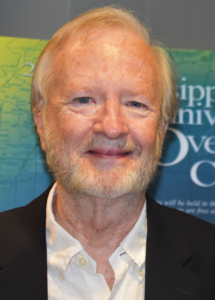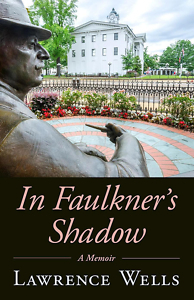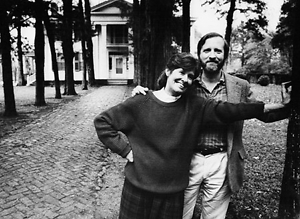The Past Is Never Dead
A new memoir by Lawrence Wells pulls back the curtain on a Southern literary community
In his engaging memoir, In Faulkner’s Shadow, writer and publisher Lawrence Wells describes William Faulkner’s enduring influence on the literary community of Oxford, Mississippi, by invoking a well-known quip from Flannery O’Connor. As Wells renders it, “When asked ‘What’s it like to write in the shadow of Faulkner?’ Flannery O’Connor famously replied, ‘Nobody wants his mule and wagon caught on the tracks when the Dixie Express comes through.’”
 As it turns out, living in the shadow of William Faulkner — or “Pappy,” as he was known to his family — isn’t so easy either. Although he never met the man himself, who died in 1962, Wells married Faulkner’s beloved niece, Dean, in 1972. They spent their life together in Faulkner’s hometown of Oxford, living in Dean’s grandmother’s home and surrounded by extended family. Eventually, Wells and his wife took over operation of the local independent publishing company, Yoknapatawpha Press, named after the fictional county William Faulkner made famous. Their connections at the University of Mississippi (“Ole Miss”), in the publishing world, and through the celebrity of the Faulkner name gave the couple a rare view into the Southern literary community during their nearly 40 years together.
As it turns out, living in the shadow of William Faulkner — or “Pappy,” as he was known to his family — isn’t so easy either. Although he never met the man himself, who died in 1962, Wells married Faulkner’s beloved niece, Dean, in 1972. They spent their life together in Faulkner’s hometown of Oxford, living in Dean’s grandmother’s home and surrounded by extended family. Eventually, Wells and his wife took over operation of the local independent publishing company, Yoknapatawpha Press, named after the fictional county William Faulkner made famous. Their connections at the University of Mississippi (“Ole Miss”), in the publishing world, and through the celebrity of the Faulkner name gave the couple a rare view into the Southern literary community during their nearly 40 years together.
Stories of William Faulkner and his kinfolk make up only about one-third of the book, although the Nobel Prize-winning writer’s spirit certainly pervades it. Wells uses terms such as “anger-management problems” and “bulletproof arrogance” when describing Dean’s relatives. Readers will enjoy the fun facts (Pappy was fond of playing “cutthroat croquet,” raising mules, and telling ghost stories) and colorful anecdotes (most of which involve drinking, jealousy, violence, or, usually, all three). It’s clear that literary success is no guarantee of local popularity. Shortly after his arrival in Oxford, Wells visits Varner’s Repair Shop to seek help for his broken typewriter. When he remarks that Faulkner used the name “Varner” in his work, the proprietor mutters, “If that Faulkner feller was still around, I wouldn’t cross the street to speak to him.”
 The second section of the book is devoted to Wells’ personal recollections of his literary acquaintances, principally Ole Miss faculty members and legendary characters Willie Morris and Barry Hannah. Wells describes celebrated author and editor Morris as “in the first pantheon of Mississippi writers alongside William Faulkner, Eudora Welty, Walker Percy, and Shelby Foote.” In 1980, he and Dean are instrumental in persuading the university to create a writer-in-residence position for Morris, who would become a beloved friend. Wells describes Morris’ legendary alcohol consumption, bad behavior, and famous visitors during his 10-year residence in Oxford, including William Styron, Alex Haley, Jim Harrison, George Plimpton, James Dickey, and David Halberstam.
The second section of the book is devoted to Wells’ personal recollections of his literary acquaintances, principally Ole Miss faculty members and legendary characters Willie Morris and Barry Hannah. Wells describes celebrated author and editor Morris as “in the first pantheon of Mississippi writers alongside William Faulkner, Eudora Welty, Walker Percy, and Shelby Foote.” In 1980, he and Dean are instrumental in persuading the university to create a writer-in-residence position for Morris, who would become a beloved friend. Wells describes Morris’ legendary alcohol consumption, bad behavior, and famous visitors during his 10-year residence in Oxford, including William Styron, Alex Haley, Jim Harrison, George Plimpton, James Dickey, and David Halberstam.
“All writers begin as book fiends, eggheads, and smart-alecks,” Wells writes of Barry Hannah. “As fuel for fiction they nurture neuroses and hang onto slights endured in junior high.” At their first meeting in the early 1980s, the knife-wielding Hannah surprises Wells by making a drunken pass at his wife: “I could overpower you and take your woman,” he boasts. Much to her husband’s amusement, Dean quickly replies, “You’ll have to fight both of us.” But when university administrators balk at adding the notoriously unpredictable National Book Award nominee to the faculty, it is Wells who advises, “Are you kidding? Even if Hannah lasts only a year what other southern university can match the Willie and Barry show?” Hannah goes on to last almost three decades at Ole Miss and inspires scores of students, including Larry Brown and Donna Tartt.

In the final portion of the memoir, Wells writes of his tumultuous yet deeply loving relationship with his favorite Faulkner — his wife, Dean. Because her father and namesake died before she was born, Dean’s famous uncle became her legal guardian when she was 8 years old. They enjoyed a close relationship, yet her identity as “Mr. Faulkner’s niece” proved as burdensome as it was advantageous. In 2010, shortly before her death, Dean published her final words on the Faulkner family legacy in an autobiography, Every Day by the Sun. Wells observes, “To those born without it genius can be a forbidding heritage.” But Dean’s desire to make peace with her complicated history near the end of her life is something that William Faulkner likely would have understood. “The past is never dead,” he wrote. “It’s not even past.”

Tina Chambers has worked as a technical editor at an engineering firm and as an editorial assistant at Peachtree Publishers, where she worked on books by Erskine Caldwell, Will Campbell, and Ferrol Sams, to name a few. She lives in Chattanooga.


